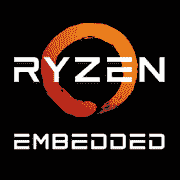AMD Ryzen Embedded 5950E

AMD Ryzen Embedded 5950E: Power and Efficiency for Professionals
Considering a processor for demanding tasks: from rendering to servers
1. Key Specifications: Architecture, Process Technology, and Key Features
The AMD Ryzen Embedded 5950E is built on the Zen 3 architecture (codename Vermeer) and manufactured using a 7nm process technology. This 16-core chip supports 32 threads thanks to SMT (Simultaneous Multithreading) technology. The L3 cache size is 64 MB, which accelerates data processing in multi-threaded scenarios.
Key Features:
- Precision Boost 2 and XFR (Extended Frequency Range): automatically increase frequency based on workload and temperature.
- Energy Efficiency: TDP of 105W provides a balance between power and thermal output.
- PCIe 4.0 Support: 24 lanes for fast connection of NVMe drives and graphics cards.
Practical Example: In Cinebench R23 tests, the processor scores around 28,000 points in multi-threaded mode, which is close to the results of the Ryzen 9 5950X but optimized for prolonged loads.
2. Compatible Motherboards: Sockets and Chipsets
The processor uses the AM4 socket, making it compatible with motherboards on the X570, B550, and A520 chipsets.
Recommendations:
- For Overclocking: choose motherboards with the X570 chipset (e.g., ASUS ROG Crosshair VIII Hero) — they have enhanced power delivery (VRM) and support PCIe 4.0.
- Budget Option: motherboards on B550 (MSI B550 Tomahawk) — suitable for most users.
- Important: Update the BIOS before installing the processor. Some older motherboards require an update to work with Vermeer.
3. Supported Memory: DDR4 with Optimization
The Ryzen 5950E works with DDR4, supporting frequencies up to 3200 MHz (officially). However, many motherboards allow overclocking memory up to 3600–4000 MHz in XMP mode.
Tips:
- Use a dual-channel configuration (2 or 4 modules) for maximum bandwidth.
- Optimal size: 32 GB (2×16 GB) for rendering or 64 GB for virtualization.
Example: The G.Skill Trident Z Neo 3600 MHz (CL16) kit demonstrates stable performance with this processor.
4. Power Supply: Power Calculation
With a TDP of 105W, the minimum PSU power is 500W, but considering the graphics card and peripherals:
- With RTX 3070: 650W (e.g., Corsair RM650x).
- With RTX 3080/4090: 750–850W (Seasonic Prime GX-750).
Important: Choose power supplies with 80 Plus Gold/Platinum certification and separate power cables for CPU and GPU.
5. Pros and Cons of AMD Ryzen Embedded 5950E
Pros:
- High multi-threaded performance.
- Energy efficiency for 16 cores.
- Long-term support (relevant for Embedded solutions).
Cons:
- No integrated graphics — a discrete graphics card is required.
- Limited overclocking: the multiplier is locked (unlike Ryzen 9 5950X).
6. Use Cases
- Work Tasks: rendering in Blender, code compilation, Big Data processing.
- Servers and Virtualization: running many VMs simultaneously.
- Gaming: with a powerful GPU (e.g., RX 7900 XT), the processor will not become a bottleneck even at 4K.
- Multimedia: video encoding in HandBrake or DaVinci Resolve.
Real Example: A video editing studio uses the 5950E for rendering 8K video, reducing processing time by 30% compared to Ryzen 7 5800X.
7. Comparison with Competitors
- Intel Core i9-10900K (10 cores, 20 threads): Lags in multi-threaded tasks but excels in some gaming scenarios.
- Ryzen 9 5950X: Similar performance but has an unlocked multiplier and a TDP of 105W.
- Intel Xeon W-2275 (14 cores): More expensive and less efficient in power consumption.
Conclusion: The 5950E is optimal for those needing stability and longevity without overclocking.
8. Assembly Tips
- Cooling: A cooler like the Noctua NH-D15 or AIO liquid cooler NZXT Kraken X63.
- Case: With good ventilation (e.g., Fractal Design Meshify C).
- Storage: NVMe SSD (Samsung 980 Pro) for fast OS and application loading.
- Backup Power: UPS for protection from power surges (important for servers).
9. Final Verdict: Who Should Consider the Ryzen Embedded 5950E?
This processor is designed for:
- Professionals: designers, programmers, engineers.
- Enthusiasts: who appreciate a balance between power and energy efficiency.
- Corporate Users: building workstations or servers with a long lifecycle.
Why it? 16 cores and 32 threads at a relatively moderate price (compared to Threadripper) make it an ideal tool for complex tasks. However, if you need integrated graphics or overclocking, consider the Ryzen 9 5950X or Intel Core i9-13900K.
Conclusion: The AMD Ryzen Embedded 5950E is a choice for reliability and performance. It’s not for everyone, but where stability and multi-threaded power are required, it has no equal.
Basic
CPU Specifications
Memory Specifications
GPU Specifications
Share in social media
Or Link To Us
<a href="https://cputronic.com/cpu/amd-ryzen-embedded-5950e" target="_blank">AMD Ryzen Embedded 5950E</a>